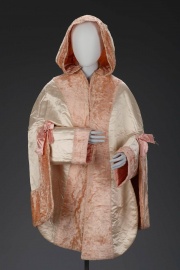Difference between revisions of "Satin weave"
Jump to navigation
Jump to search
(username removed) |
|||
| (5 intermediate revisions by 3 users not shown) | |||
| Line 1: | Line 1: | ||
| − | [[File:2002.699.1-SC63789.jpg|thumb|]] | + | [[File:2002.699.1-SC63789.jpg|thumb|Satin weave robe<br>MFA# 2002.699]] |
== Description == | == Description == | ||
| − | One of three fundamental fabric weaving patterns: [ | + | One of three fundamental fabric weaving patterns: [[plain%20weave|plain]], satin, and [[twill%20weave|twill]]. Satin weave is made by passing filling yarns over 1 warp yarn then under 4-12 warp yarns. The long filling threads, called floats, produce a smooth shiny surface, but are susceptible to snags. Examples of satin weave fabrics are [[satin|satin]], Venetian cloth, and messaline. |
| − | See also [ | + | See also [[sateen%20weave|sateen weave]]. |
== Additional Images == | == Additional Images == | ||
<gallery> | <gallery> | ||
| − | File: | + | File:38.1151-SC319.jpg|Satin embroidery<br>MFA# 38.1151 |
| − | File:52.833-SC15304.jpg| | + | File:Satin slippers MFA.jpg|Satin slipper's<br>MFA# 50.2680 |
| + | File:52.833-SC15304.jpg|Textile fragment<br>MFA# 52.833 | ||
</gallery> | </gallery> | ||
| + | == Resources and Citations == | ||
| − | + | * Hoechst Celanese Corporation, ''Dictionary of Fiber & Textile Technology'' (older version called Man-made Fiber and Textile Dictionary, 1965), Hoechst Celanese Corporation, Charlotte NC, 1990 | |
| − | * | + | * Rosalie Rosso King, ''Textile Identification, Conservation, and Preservation'', Noyes Publications, Park Ridge, NJ, 1985 |
| − | * | + | * Edward Reich, Carlton J. Siegler, ''Consumer Goods: How to Know and Use Them'', American Book Company, New York City, 1937 |
| − | * | + | * Hermann Kuhn, ''Conservation and Restoration of Works of Art and Antiquities'', Butterworths, London, 1986 |
| − | |||
| − | |||
* Art and Architecture Thesaurus Online, http://www.getty.edu/research/tools/vocabulary/aat/, J. Paul Getty Trust, Los Angeles, 2000 | * Art and Architecture Thesaurus Online, http://www.getty.edu/research/tools/vocabulary/aat/, J. Paul Getty Trust, Los Angeles, 2000 | ||
Latest revision as of 11:24, 19 October 2020
Description
One of three fundamental fabric weaving patterns: plain, satin, and twill. Satin weave is made by passing filling yarns over 1 warp yarn then under 4-12 warp yarns. The long filling threads, called floats, produce a smooth shiny surface, but are susceptible to snags. Examples of satin weave fabrics are Satin, Venetian cloth, and messaline.
See also Sateen weave.
Additional Images
Resources and Citations
- Hoechst Celanese Corporation, Dictionary of Fiber & Textile Technology (older version called Man-made Fiber and Textile Dictionary, 1965), Hoechst Celanese Corporation, Charlotte NC, 1990
- Rosalie Rosso King, Textile Identification, Conservation, and Preservation, Noyes Publications, Park Ridge, NJ, 1985
- Edward Reich, Carlton J. Siegler, Consumer Goods: How to Know and Use Them, American Book Company, New York City, 1937
- Hermann Kuhn, Conservation and Restoration of Works of Art and Antiquities, Butterworths, London, 1986
- Art and Architecture Thesaurus Online, http://www.getty.edu/research/tools/vocabulary/aat/, J. Paul Getty Trust, Los Angeles, 2000



